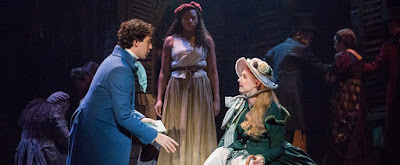A few years ago I reviewed Tom Hooper's movie adaptation of the successful stage musical Les Miserables, a film that sparked in me a love for Victor Hugo's book. As I've finally had a chance to see the musical live on stage at the Stranahan Theater in Toledo last Saturday I wanted to share my thoughts...
What stuck out to me the most, and what you can't appreciate on bootleg recordings (yes I watch those) of the play is the the blocking of the actors, the set design and the lighting. The production is simply amazing and in many ways, it has further emphasized what was lacking in the film version: a sense of visual storytelling. Often times the way a scene is blocked on stage is suggestive of a painting and is aided by the magnificent set design, where the people of Paris seem dwarfed by the cities buildings. The lighting is positively cinematic and helps to reinforce thematic and character beats. In the scene where Jean Valjean faces Javert before revealing his identity the lighting puts there shadows in opposition then, after Javert exits the scene, Valjean's shadow is split in three, representing the characters internal conflict over whether he should turn himself in.
Being seated near the back of the theater I could not fully appreciate the performances. Still vocally and, from what I can tell otherwise, the performers all did a great job, especially Nick Cartell and Josh Davis as Valjean and Javert. Mary Kate More, too, impresses as Fantine. Paige Smallwood is absolutely fantastic as Éponine, probably the best portrayal of the character I've yet seen. J Anthony Crane and Allison Guinn are both having a blast as the Thénardiers, even if the latter goes a little too over-the-top at times. The young children playing Cosette (Cate Elefante) and Petite Gavroche (Parker Dzuba) acquit themselves admirably. Jillian Butler too puts in a strong performance as the older Cosette. The only real weak spot was Joshua Grosso as Marius, who does a fine job portraying a young man head-over-heals in love with a girl he's just met (no easy task to be sure) but comes off a little forced as the young revolutionary hothead. Fortunately, Matt Shingledecker more then makes up for his lack of revolutionary fervor with his Enjolras.
The story remains a powerful one, even in the truncated form the musical leaves it in. Valjean's redemption and his latter decision to turn himself in, Fantine's sorrow, and Javert's despair are all really affective. The latter scene, in particular, is one I've really come to appreciate over the years (Crowe's stolid performance did not put the character into focus in my first encounter with the story). Javert is, by the end of the story, Valjean's opposite. Both characters have their worldview challenged because of a life-changing encounter with a more saintly person.
When the bishop covers up Jean Valjean's crimes and even gives him the rest of his silver (turning the other cheek in a sense) Valjean's pessimistic worldview is challenged and he ultimately pursues a more saintly life. Javert, when his life is spared by the man who he's hunted for so many years has his own black-and-white worldview shattered. If Valjean, in Javert's eyes an irredeemable criminal, has saved his life then Javert in a sense, owes him a debt. Unable to choose between this sense of honor and his duty to the law, Javert despairs and kills himself. Unlike Valjean he refuses to change his outlook. Through this Hugo makes plain for me the nature of evil and the possibility of eternal damnation.
The biggest problem with the musical remains the third act, where the story loses its focus and Valjean's internal struggles take a back seat to the revolutionary conflict. It's simply too condensed to really convey the depth of character or explore the various parallels between the characters that exist in the novel. There's also a little too much time spent with the Thénardiers, whose main function is to provide comic relief.
Still, it is the contradictions in the story (as is the case in many great stories) that define. Hugo was both a devout Catholic and an ardent revolutionist. Thus you have characters like the Bishop, who is an old fashioned saintly clergy, but you also have Hugo's extended rant about cloistered religious life. The French revolution is portrayed as a positive force, but Hugo is ambivalent about the persecution of the church that the revolutionaries pursued. Similarly, Hugo has a bit of a love/hate relationship with Napoleon who, on one hand, he sees as a defender of democracy but, on the other, as a shameless dictator.
The play only touches on these contradictions. The only thing were really left with is the contrast between Valjean and Marius' French revolutionary compatriots. Like the book, the play is clearly in sympathy with these men but we are left with the sense that is small acts of kindness and mercy (as Valjean performs throughout the film) that really make a difference in the end.
It amazes me how popular this story, with all its explicitly Catholic milieu and thematic power, continues to be. Yet the fact remains that just over a week ago, in a packed theater, I watched a musical that opens when a aged Catholic cleric buys a poor man's soul for God and that ends with the words, "to love another person is to see the face of God."






No comments:
Post a Comment